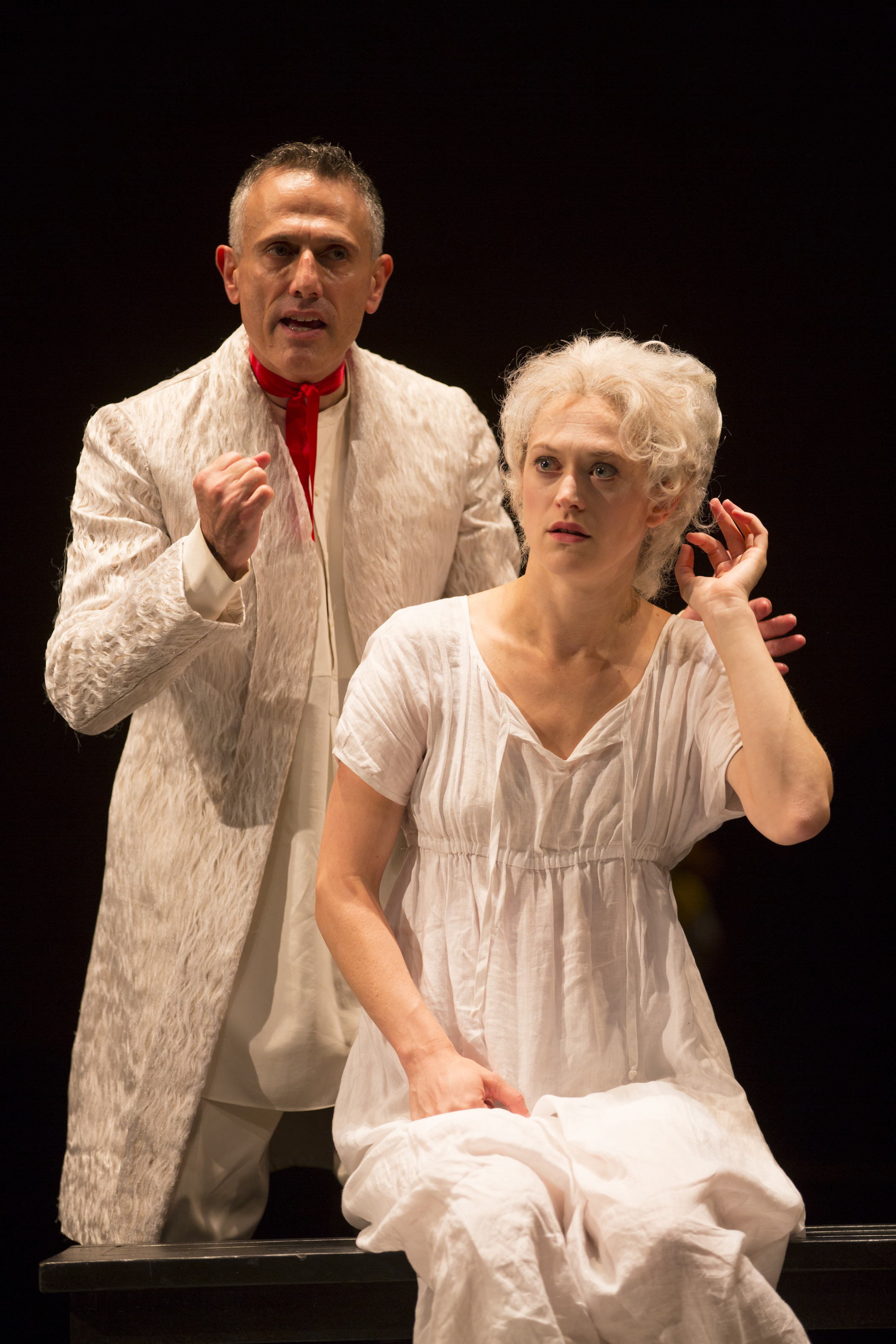Is it possible to write a review of David Adjmi’s Marie Antoinette, now playing at the Yale Rep in a production directed by Rebecca Taichman, without mentioning the 99% or making some comment situating the play within the time of OWS unrest and the like? Probably not, so I’m glad I got that out of the way. It’s a timely play, then, yes? Mais oui et non. Adjmi’s Marie (Marin Ireland) speaks like a contemporary airhead, certainly (and amusingly), but the play follows the timeline of the destruction of the reign of Louis VI closely, and peppers its dialogue with jibes au courant for the 1780s—name-dropping Rousseau, and joking about oaths in tennis courts, and taking potshots at that novel experiment in America: “common people can’t take care of themselves. Democracy can’t work.” We might take to heart the fate of a patron saint of the privileged as a send-up of what might befall those too high to fall, but Marie Antoinette isn’t really about cautionary catharsis. And anyway, among historical moralists, for every leftist railing against the empowered, there’s a rightist reminding us of how chaotic and blood-thirsty the reign of “the people” is. No morals where none intended, to paraphrase Beckett.
OK, so the play’s not quite political allegory, and it’s not quite historical drama, nor even quite historical fantasy. It’s far too confectionery to want to give us a sense of lived history, but it does seem to have something on its mind, other than laughs, giddy women (Ireland, Hannah Cabell, Polly Lee) with 3-foot-tall wigs on their heads, a king (Steven Rattazzi) who reminded me of Abbott’s little buddy Costello and who likes to play with clocks, and a queen in a Bo-Peep outfit who converses with a sheep (David Greenspan). Adjmi seems most interested in how a teenaged twit—Marie was married off by her mother at age 14—became the emblem of aristocratic indifference and noblesse indulge. In his hands, Marie’s tale is the story of how a fashion queen became a scourge—a bit like how, in our day, every pop diva eventually gets dissed—while remaining, y’know, classic and iconic.
Riccardo Hernandez’s set, initially, is all bright colors and shine, with the characters positioned in it as if sitting ducks in an arcade. There are props to prop-up an illusion of surroundings, but this is a streamlined fantasy of court life as bodies in space, with very precise marks to hit. Gabriel Berry’s costumes play in a lively space between period fashions and what our era might do with them, and, in the early going, the play has the feel of a lively burlesque of the eighteenth century. Once Marie begins conscientiously to scrimp a bit on egregious ostentation, things get more straitened—and part of the drama is to watch her go from the absurd wigs to having her actual hair—turned white—shorn from her head by a Guard (Brian Wiles, great at steely contempt).
Such gestures are where most of the drama occurs, along with wonderful touches like an explosion of sound (Matt Hubbs, sound design) and fake dirt that expresses to visceral effect the loss of aristocratic status once the revolution comes, and a very powerful moment of echoing laughter from Louis, Marie and their son (Ashton Woretz) that speaks eloquently about the humanity of even the most detestable tyrant. Here, the rulers aren’t detestable so much as clueless, which helps to pump some pathos into them, but, in the end, it also flattens them a bit too much into caricatures. When Marie says, “Sometimes I feel like a game that other people play but without me,” it rings true—in part because the play plays her that way too, kind of like “Gidget Goes Regal.”
The great asset of this show—besides its look and sound—is Marin Ireland: her Marie is so vapidly winning or winningly vapid you hope to protect her from unsettling lessons about reality, and you do begin to feel something for someone who has to live such a relentlessly scrutinized life, even if her whining about it gets old. Ireland’s performance scores so often on comic timing you’re never quite sure if you’re laughing at her or with her. And isn’t that how it is with the upper-class: we know we can’t beat ‘em or join ‘em, so let’s be amused by them. When things turn bleak, we’re not exactly going to embrace the likes of the Sauces (Fred Arsenault and Hannah Cabell), two rustics who grab the Royals on their bid for freedom, nor side much with a Guard who spits in his ex-sovereign’s face. Or are we?
That’s the sticking point of the play, really. Its vignettes start to feel like the clips in a reality TV show, though instead of a make-over toward beauty, power and prestige, this one is going in the opposite direction—toward state-mandated death. And we’re along for the ride, deciding at which point to disengage. As the sheep (and this play could use more David Greenspan) says to Marie in a very chilling moment: “Step carefully.”
And if that tsunami of dirt makes you think of the famous line “aprés moi, le déluge,” often attributed to Louis’s dad, Louis XV, seeing the show soon after Hurricane Sandy might make the play’s “before and after” seem even closer to home. C’est la vie, ma chérie, it goes to show you never can tell.
Marie Antoinette By David Adjmi Directed by Rebecca Taichman
Choreographer: Karole Armitage; Scenic Designer: Riccardo Hernandez; Costume Designer: Gabriel Berry; Christopher Akerlind: Lighting Designer; Matt Hubbs: Sound Designer; Matt Acheson: Puppet Designer; Jane Guyer Fujita: Voice Coach; J. David Brimmer: Fight Director; Tara Rubin Casting: Casting Director; Amanda Spooner: Stage Manager
Yale Repertory Theatre October 26-November 17, 2012
Photographs by T. Charles Erickson, courtesy of the Yale Repertory Theatre


